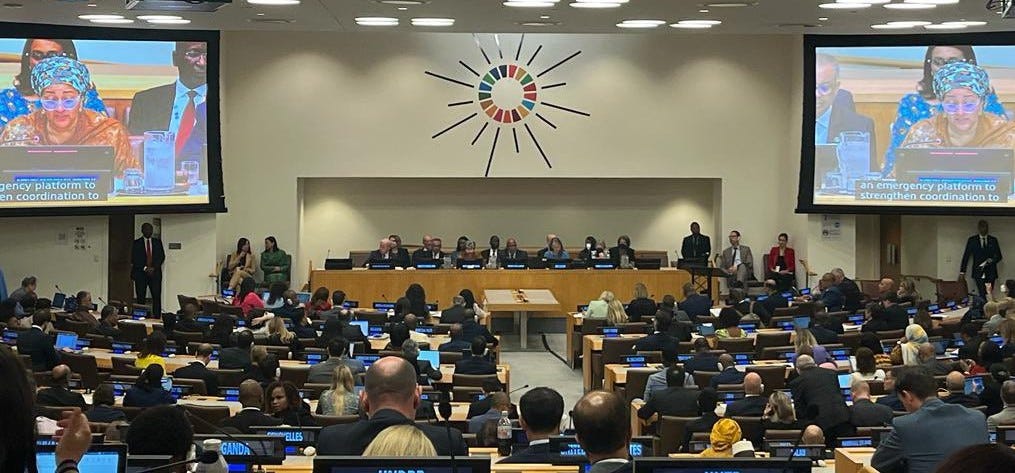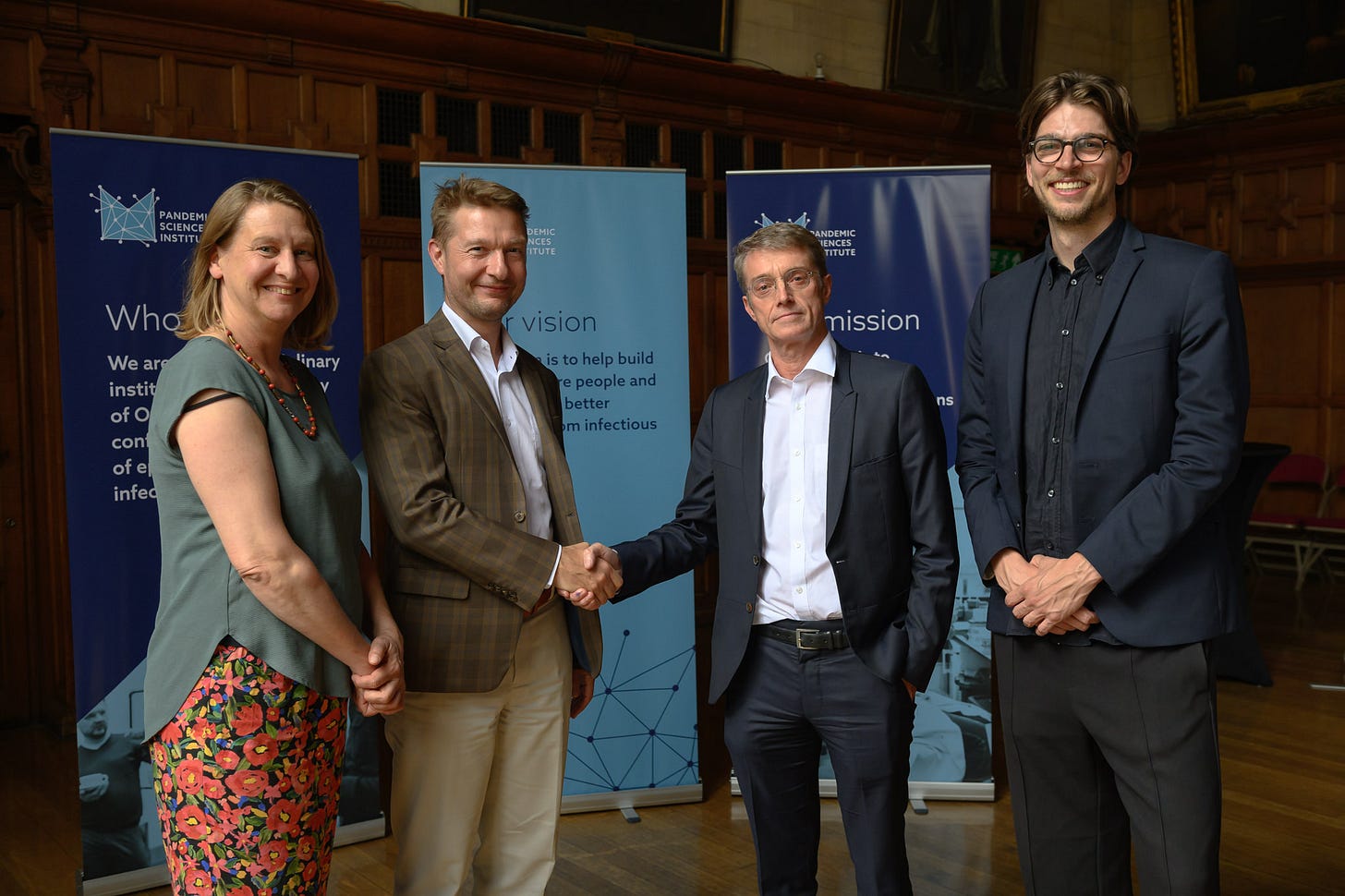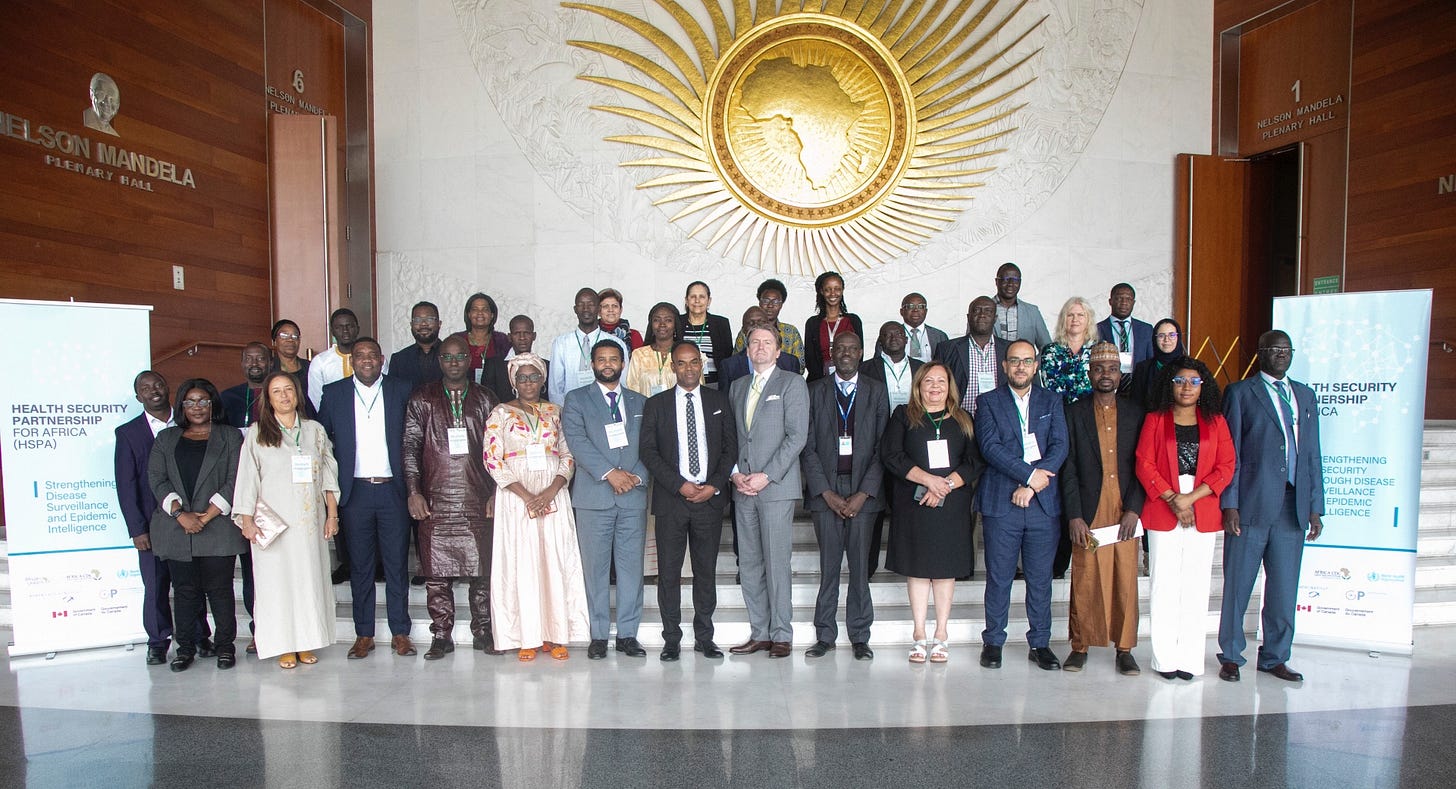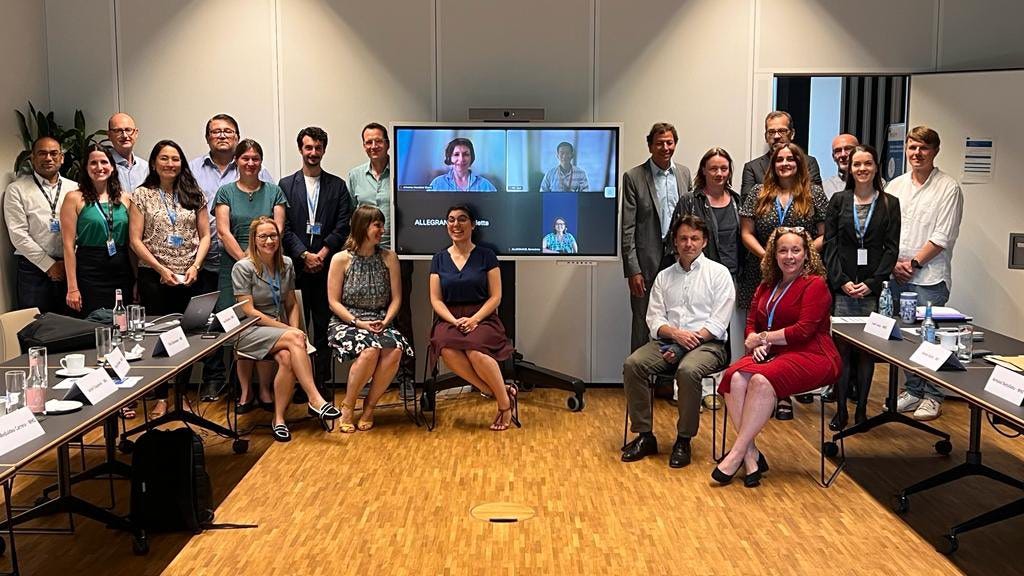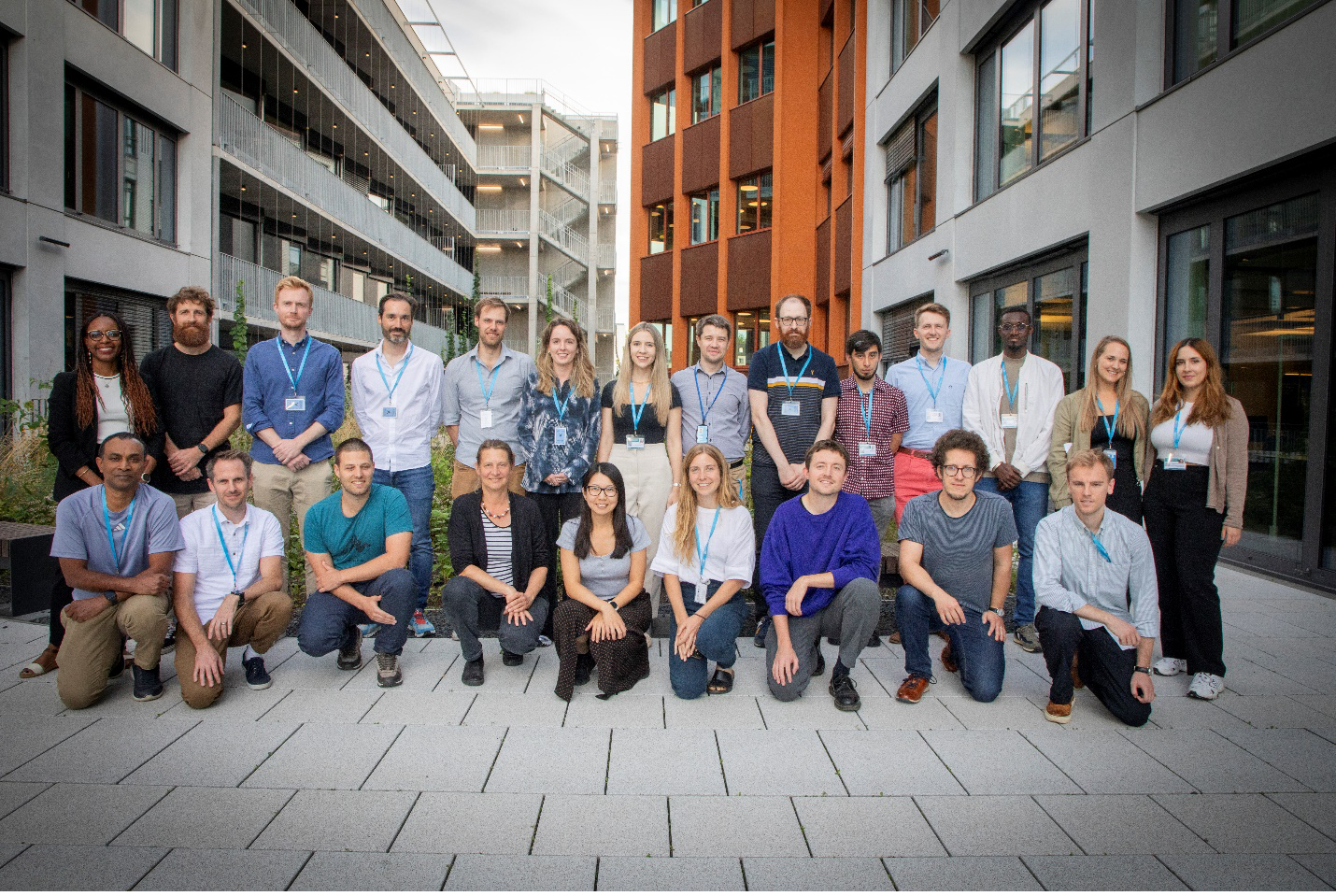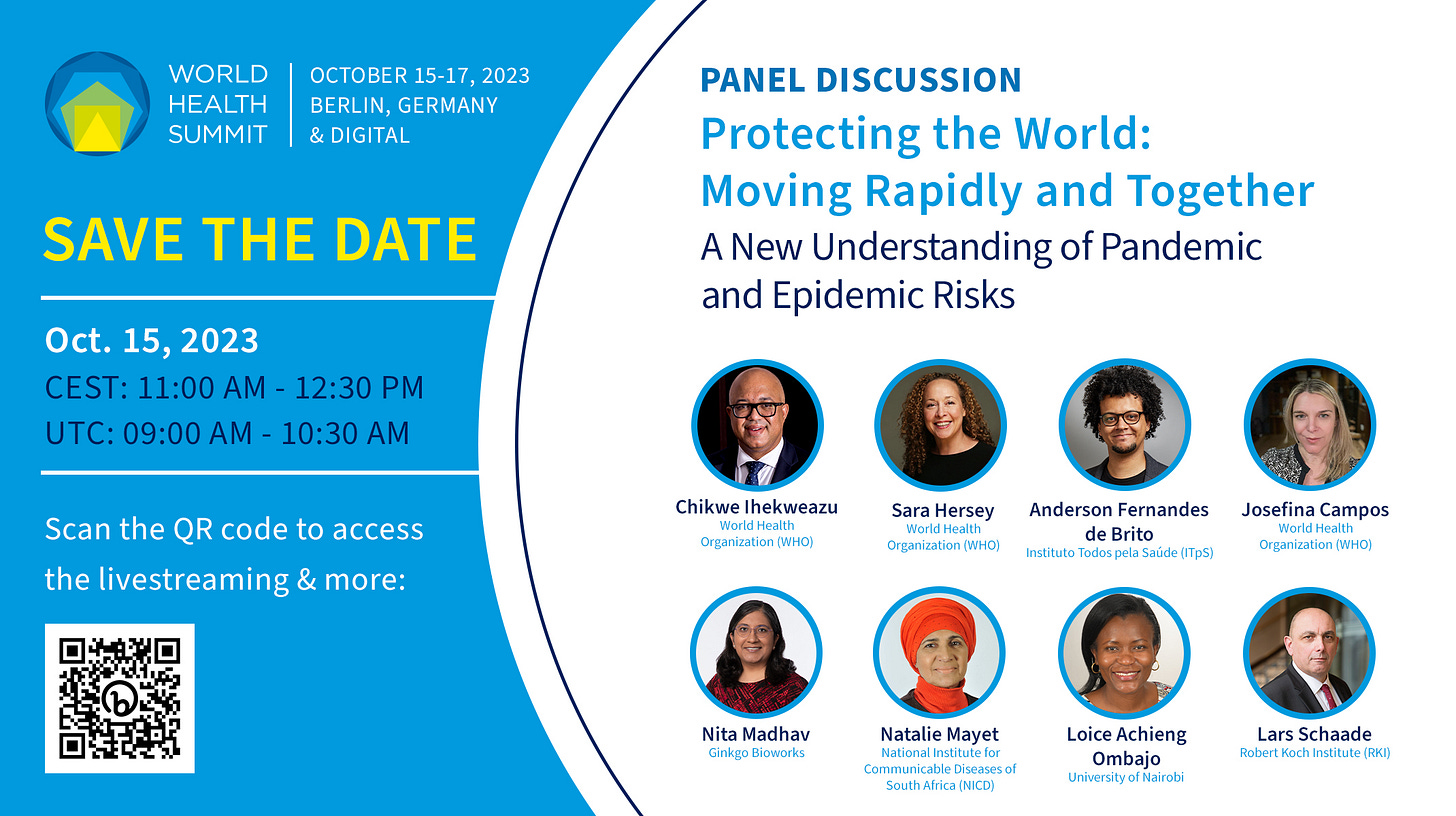Over the last three months, we have accomplished significant milestones. We are pleased to share with you a selection of these highlights from the WHO Hub for Pandemic and Epidemic Intelligence:
Visit by the German Federal Minister of Health to the WHO Hub
Launch of the ‘Health Security Partnership to Strengthen Disease Surveillance and Epidemic Intelligence in Africa’ initiative with Africa CDC and RKI
Historic High-Level Meeting on Pandemic Prevention, Preparedness and Response during the 78th session of the United Nations General Assembly
Advancing collaborative surveillance at the 73rd session of the WHO Regional Committee for Africa
Hackathon focused on early-stage outbreak analytics: predictable data and predictable questions
New partnership with the Pandemic Sciences Institute at Oxford to enhance global disease surveillance
Public health intelligence capacity building: 2023 EIOS Training of Trainers
Advancements with RKI to strengthen pandemic and epidemic intelligence
Experience sharing on the use of artificial intelligence for disease surveillance
Exciting upcoming events at the World Health Summit 2023
Read on for more details!
GLOBAL ENGAGEMENT AND PRIORITY SETTING
Historic High-Level Meeting on Pandemic Prevention, Preparedness and Response during the 78th Session of the United Nations General Assembly (UNGA)
In September 2023, Director General, Dr Tedros Adhanom Ghebreyesus on behalf of WHO, welcomed a political declaration endorsed by global leaders to strengthen the international cooperation, coordination, governance and investment needed to make the world better prepared for future pandemics.
As part of WHO’s Health Emergencies Programme, the WHO Hub for Pandemic and Epidemic Intelligence is committed to advancing global surveillance and public health intelligence through the collaborative surveillance approach. Leveraging the momentum from this historic commitment, we look forward to collaborating with Member States, national public health agencies (NPHAs) and stakeholders across disciplines and geography. Our goal is to strengthen regional and global solidarity for future health emergencies and to build a robust and coordinated global emergency health architecture that protects health security and improves health for all.
Assistant Director-General Dr. Chikwe Ihekweazu accompanied the Executive Director of the WHO Health Emergencies Programme to the High-Level Meeting on Pandemic Prevention, Preparedness and Response as part of the WHO delegation to UNGA. Read his reflections here.
© WHO
New Partnership with the Pandemic Sciences Institute at Oxford to Enhance Global Disease Surveillance
On July 26 2023, the WHO Hub for Pandemic and Epidemic Intelligence announced a new partnership with the Pandemic Sciences Institute (PSI) at the University of Oxford to strengthen disease surveillance alongside pandemic and epidemic intelligence efforts.
This new partnership includes the application of data science and analytical frameworks to enhance early warning, detection, tracking and monitoring of health threats. Specifically, it will:
Develop analytical frameworks, algorithms and other data science methods to improve pandemic preparedness and response
Deliver methodologies to integrate, interrogate and exchange epidemiological, genomic, clinical and metadata in analytic frameworks so that countries can better detect and respond to outbreaks
Develop methodologies to collect, harmonise, interpret and communicate information on policies and behaviours around pandemics
Ensure bioinformatics tools are integrated during outbreak responses to better identify the pathogens causing each outbreak
In the words of Dr Moritz Kraemer, Investigator, Pandemic Sciences Institute & Associate Professor, Department of Biology, University of Oxford,
“This partnership builds on decades of collaboration between the University of Oxford and WHO and will enable the development of global, equitable and modern public health tools to accelerate the response to growing risks from infectious diseases.”
© Ryan Cowan / PSI
COUNTRY AND REGIONAL PERSPECTIVES
Visit by the German Federal Minister of Health to the WHO Hub
On August 3 2023, we had the honour of hosting the German Federal Minister of Health Prof. Dr. Karl Lauterbach, at the WHO Hub for Pandemic and Epidemic Intelligence in Berlin.
With Germany’s support and visionary leadership, the Hub has embarked on a mission to build an architecture for global collaboration and trust. This framework serves as the bedrock for strengthening national, regional and global preparedness, as well as our collective capacity to prevent and respond to future public health emergencies.
More about the visit here.
Launch of the ‘Health Security Partnership to Strengthen Disease Surveillance and Epidemic Intelligence in Africa’ Initiative with Africa CDC and RKI
On July 18 2023, the World Health Organization (WHO), Africa Centres for Disease Control and Prevention (Africa CDC) and the Robert Koch Institute (RKI) launched the Health Security Partnership to Strengthen Disease Surveillance and Epidemic Intelligence in Africa (HSPA) initiative. This partnership is designed to strengthen Africa’s health security capabilities in critical areas including biosecurity, integrated disease surveillance, event-based surveillance, genomic surveillance, and epidemic intelligence.
The HSPA is a collaborative initiative jointly implemented by the Africa CDC, RKI, WHO Regional Offices for Africa (AFRO) and the Eastern Mediterranean (EMRO) and the WHO Hub for Pandemic and Epidemic Intelligence. It builds on and complements various ongoing joint initiatives aimed at supporting African countries to safeguard public health. This includes the recently launched Joint Emergency Action Plan (JEAP) framework: a five-year strategic collaboration between WHO AFRO, EMRO and Africa CDC, which focuses on strengthening public health surveillance, promoting regional cooperation and addressing health challenges in Africa.
A primary objective of the HSPA is to empower and encourage strong country leadership. In its first phase, the partnership will be implemented in six African Union Member States (The Gambia, Mali, Morocco, Namibia, Tunisia, and South Africa). As we progress, the partnership aspires to extend its activities to additional countries in the coming years.
© Africa CDC
Advancing Collaborative Surveillance at the 73rd session of the WHO Regional Committee for Africa
From August 28 to September 1 2023, Assistant Director-General Dr. Chikwe Ihekweazu represented the WHO Health Emergencies Programme (WHE) at the seventy-third session of the WHO Regional Committee for Africa in Gaborone, Botswana.
Dr. Ihekweazu underscored the need for strong partnerships with Member States across the continent. He emphasised the importance of strengthening health emergency preparedness, response and resilience (HEPR) in collaboration with Member States. Furthermore, he highlighted the critical role of collaborative surveillance in strengthening national health emergency capabilities, fostering regional cohesion and enhancing global alignment as we work towards health for all.
© WHO
Advancements with RKI to Strengthen Pandemic and Epidemic Intelligence
On July 11 2023, the WHO Hub for Pandemic and Epidemic Intelligence welcomed partners from the Robert Koch Institute (RKI) and the German Federal Ministry of Health (BMG), along with colleagues from WHO headquarters in Geneva, for the first WHO Hub-RKI partnership steering committee meeting of 2023.
During this meeting, various aspects of project progress and upcoming activities under the WHO Hub-RKI joint workplan were presented. This includes projects aimed at strengthening antimicrobial resistance surveillance, integrated genomic surveillance, public health intelligence, and the Global Outbreak Alert and Response (GOARN) Berlin Fellowship Programme. The BMG highlighted the progress made since the signing of the WHO Hub-RKI partnership Memorandum of Understanding in 2021 and the importance of this collaboration to its mission.
© WHO / Shahid Noor
COLLABORATIVE SURVEILLANCE IN ACTION
Hackathon Focused on Early-Stage Outbreak Analytics: Predictable Data and Predictable Questions
From September 19 – 21 2023, the WHO Hub for Pandemic and Epidemic Intelligence partnered with the London School of Hygiene and Tropical Medicine (LSHTM) through its Epiverse-TRACE team to organise an "Early-Stage Outbreak Analytics Hackathon". The primary objective of the hackathon was to catalyse the development of reusable analytical tools designed to address pivotal questions and tasks during the initial phases of an outbreak. These included the extraction of hard-to-analyse data, estimation of transmission and severity, and automated visualisation of insights.
© WHO / Alfonso Moral
The hackathon was a dynamic and collaborative event that brought together experts, including modellers, data scientists, software engineers, and field epidemiologists from several institutions including Epicentre, MSF, Data.org, Imperial College London. Over the course of three days, participants engaged in group discussions, brainstorming sessions, and hands-on analytical pipeline development, resulting in the co-creation of innovative solutions and refined analytical pipelines.
The hackathon fostered a culture of collaboration, knowledge sharing, and problem-solving. Participants not only reflected on their achievements but also laid the groundwork for future initiatives. By consolidating efforts, sharing technical expertise, and leveraging state-of-the-art tools, this hackathon represents a significant step forward in enhancing outbreak analytics and developing insights for better policy and decision-making. It underscores the Hub’s commitment to preventing epidemics and pandemics.
© WHO / Alfonso Moral
Public Health Intelligence Capacity Building: 2023 EIOS Training of Trainers
The WHO Hub for Pandemic and Epidemic Intelligence hosted the 2023 Epidemic Intelligence from Open Sources (EIOS) Training of Trainers (ToT) in Berlin from September 11-15 2023. The five-day workshop welcomed over 30 participants coming from all six WHO regional offices, WHO headquarters, partner organisations and Member States.
The workshop equipped participants with the skills to deliver EIOS system and public health intelligence (PHI) training. These skills are crucial for driving the expansion of the EIOS initiative globally with an emphasis on capacity building and long-term sustainability. The training facilitated a productive exchange of knowledge and fostered innovative collaboration amongst participants. This, in turn, enabled them to define joint strategies for the delivery of PHI and EIOS trainings worldwide. This further expanded the Global EIOS Training Team to almost 80 members across the world.
More info on the EIOS Initiative can be found here.
© WHO / Alfonso Moral
Experience Sharing on the Use of Artificial Intelligence (AI) for Disease Surveillance
On July 20 2023, the WHO Hub for Pandemic and Epidemic Intelligence together with the Boston Children´s Hospital co-hosted the 7th session of its Pandemic and Epidemic Intelligence Innovation Forum. The virtual session brought together over 90 participants representing various organisations globally.
The session explored practical application of AI-assisted technologies to infectious disease surveillance, shedding light on how these innovations can complement the efforts of the public health surveillance workforce.
We learned so much from participants. Boston Children's Hospital showcased advancements in the application of large language models to specific domains of clinical medicine and explored AI's current roles in infectious disease surveillance. The Global South AI for Pandemic & Epidemic Preparedness & Response Network (AI4PEP) and its partners emphasised the significance of developing and implementing responsible AI solutions that contribute to improving health equity. MSF shared progress in leveraging AI to combat antibiotic resistance, including the development of Antibiogo, a cost-free smartphone application capable of functioning offline. Finally, the School of Medical Sciences at the University of Sydney is actively exploring applications of Natural Language Processing (NLP) in the realm of information surveillance, with a particular focus on addressing issues related to misinformation.
© WHO / Gülce Tuncer
UPCOMING EVENTS
Exciting Events Planned Around the World Health Summit (WHS) 2023
October 13: IPSN Global Partners Forum
Following the launch of the International Pathogen Surveillance Network (IPSN) in May 2023, the WHO Hub for Pandemic and Epidemic Intelligence will host the inaugural Global Partners Forum on October 13 in Berlin, ahead of the World Health Summit 2023. This Forum provides a platform for public health practitioners, academics, policymakers, and financial institutions to catalyse innovations, and socialise new ideas in pathogen genomic surveillance through partnership.
More information can be found here.
October 15: ‘Protecting the World: Moving Rapidly and Together’ Panel Discussion at WHS 2023
Mark your calendars for October 15 2023, when the WHO Hub for Pandemic and Epidemic Intelligence will lead a panel discussion at the World Health Summit 2023. This session will highlight the role of advanced tools including technology, innovation, big data, artificial intelligence, and more in providing decision-makers with timely and robust intelligence during public health emergencies.
Convening a diverse group of stakeholders from across the world, the session will explore strategies to systematically strengthen collaborative surveillance capacities at all levels. The ultimate goal is to enable better informed decisions and coordinated actions when they matter most.
The event will be livestreamed here from 11:00 a.m. to 12:30 p.m. (CEST). Please follow our social media and website for the latest updates.



